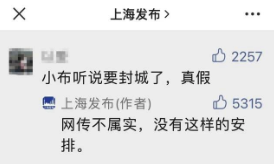As Shanghai enters its sixth week of lockdown, commentators in the West are asking when China will give up on its ZeroCovid dream. But not everyone in my homeland, mainland China, supports the ZeroCovid policy. You wouldn’t notice it from western media reports, filled with phrases like “Beijing says” or “the CCP thinks”, but among more than 20 Chinese provincial governments and more than 600 city governments there has been a surprising degree of disagreement.
Even Mao famously said, “Having no divisions inside a party is an imperialist thought; having no factions within a party is an absurd fantasy.” Nowhere is this more apparent than in the tensions between the central Beijing government and the regional Shanghai authority.
It all started in early March when a total of 582 Covid cases were reported in Shanghai between 1st-10th March, breaking the year-long run of zero to single-digit positive cases. It was an outcome on which Shanghai prided itself due to its “precise control” strategy. And despite a few panic reactions such as the closure of schools (12 March) and the suspension of public transport (13 March), the Shanghai government repeatedly stated that there would be no lockdown. Three days later, Shanghai Official Gu Honghui, the “chief” governor managing the covid measures in Shanghai, doubled down on this claim, saying that “Shanghai is not locked down at present, and it does not need to lock down now.”

ShanghaiRelease (Author): The news spread on the Internet is untrue, there is no plan to lock down the city.
By mid-March, opinions towards a possible lockdown among Shanghainese and Chinese from other cities became sharply divided. Many supported Shanghai’s refusal to lockdown, referring to examples of certain European countries, whereas others believed that Shanghai was being selfish for not locking down (“they always think they are special!” is a common refrain from many non-Shanghainese in China).
Still, Shanghai stayed open. In the city, an anonymous article called “It’s time to change covid measures” started to circulate in Chinese, which questioned the China’s ZeroCovid policy. It detailed all the ways in which the strategy was undermining society and gave a full-throated endorsement of Shanghai’s measure before it was censored half a day later on the 21st March.
For most of this period, Beijing had stayed quiet. But 12 days into Shanghai’s outbreak, Beijing sent an inspection team from its “Joint Prevention and Control Mechanism of the State Council” to the city, a clear signal that Shanghai was losing the battle. Even then, Shanghai persisted. 48 hours later, the Shanghai Government refuted the claim of lockdown seven times on different channels, twice becoming Weibo’s ‘trending topic’.
Just hours after Wu Fan, a medical expert followed and respected by many Shanghainese, declared that Shanghai was too economically important to be locked down, the city appeared to give in. Before a last-ditch effort to close half the city, the other half was subsequently locked down after the CCP ordered to ‘continue to attack with strength, expand the victory, with full effort to achieve community-level zero’.
The political battle between Shanghai and Beijing was eventually settled in favour of the capital after almost a month-long conflict. Shanghai fought, and lost — but it won’t be the last of the dissenting powers hidden under the surface of the Chinese state.
Leng Ping is a professional from mainland China living in the UK and writing under a pseudonym.










Join the discussion
Join like minded readers that support our journalism by becoming a paid subscriber
To join the discussion in the comments, become a paid subscriber.
Join like minded readers that support our journalism, read unlimited articles and enjoy other subscriber-only benefits.
Subscribe